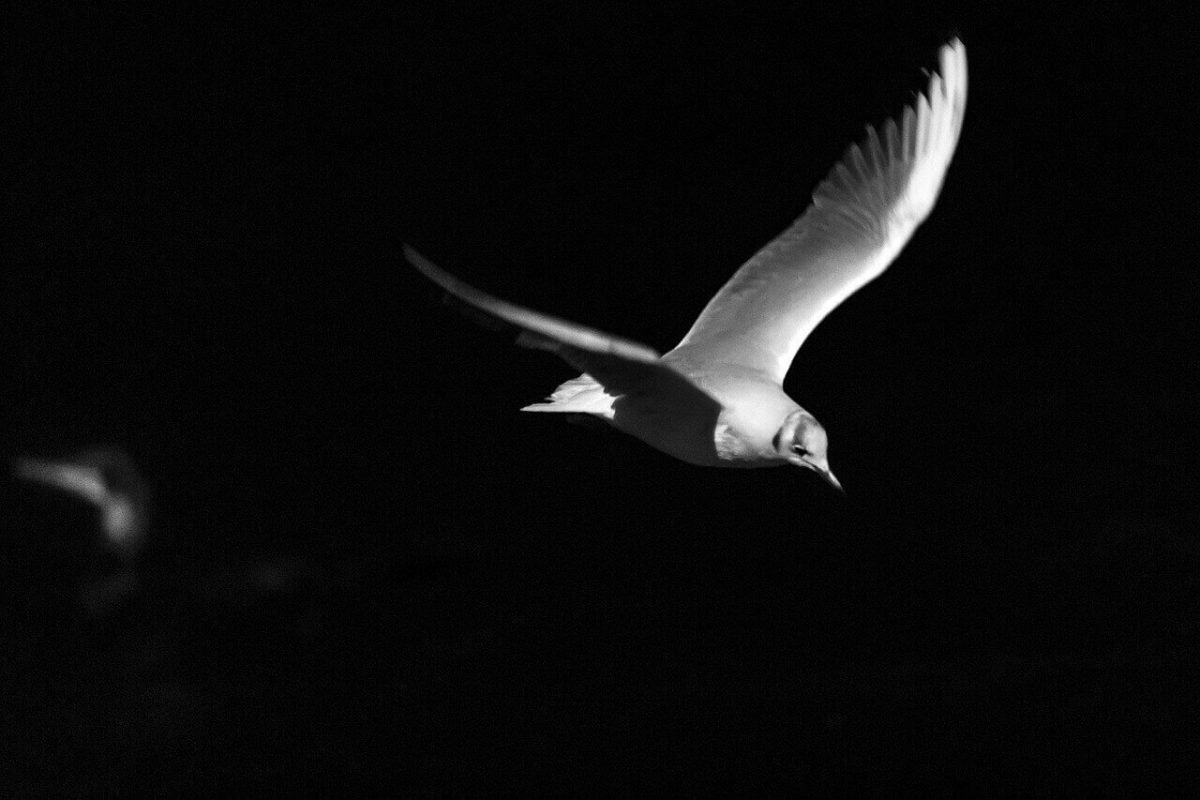Do Seagulls Fly at Night? [Yes! Here’S Why]
Most people think that seagulls are only active during the day, but they actually fly at night too! There are a few reasons for this. First of all, it’s not as hot at night so they don’t have to worry about getting too tired from flying in the heat.
Secondly, there aren’t as many predators around at night so they can feel safer flying then. Lastly, there are still plenty of food options for them to eat even when it’s dark out.
Most people think that seagulls only fly during the day, but they actually fly at night too! Here’s why:
1. Seagulls are migratory birds, so they need to travel long distances to find food.
Flying at night helps them cover more ground.
2. Seagulls have excellent eyesight, so they can see well in the dark.
3. Seagulls have special feathers that help them stay warm in cold weather.
This means they can fly even when it’s chilly outside.
Do Seagulls Sleep While Flying
Most people believe that seagulls sleep while flying, but this is not the case. Seagulls actually do not sleep at all while they are in flight. They remain alert and awake during their entire journey.
Hearing Seagulls at Night Meaning
Have you ever heard the saying, “If you want to know what God sounds like, listen to the waves”? Well, if that’s true, then seagulls must be one of His angels. There’s just something about their cry that makes you feel at peace, no matter what’s going on in your life.
But what does it mean when you hear seagulls at night?
Some people believe that hearing seagulls at night is a sign from the universe that everything is going to be alright. No matter what challenges or tribulations you may be facing in your life, they say, hearing seagulls at night means that better days are on the horizon.
So if you’re struggling with something right now and you hear a seagull crying in the middle of the night, take it as a good sign!
Others believe that hearing seagulls at night is a sign of impending death. In some cultures, birds are seen as omens of death (think: black cats crossing your path).
So if you hear a seagull crying outside your window late at night, it could be an indication that someone close to you is going to die soon. Obviously, this isn’t something anyone wants to think about but it’s important to be aware of all interpretations of hearing seagulls at night so that you can make sense of it for yourself.
Personally, I like to believe that hearing seagulls at night is simply a reminder from nature that we are not alone in this world.
It’s easy to feel isolated and lost sometimes but knowing that there are other creatures out there experiencing the same emotions can be comforting. So next time you hear a seagull crying in the middle of the night, take a moment to appreciate the sound and remember that we’re all in this together.
Why Do Seagulls Fly Over the Sea
Seagulls are one of the most commonly seen birds near the shoreline. But why do they always seem to be flying over the sea? There are a few reasons for this behavior.
For one, seagulls are looking for food. The open water is full of small fish and other aquatic creatures that seagulls like to eat. By flying over the water, they can spot potential meals more easily than if they were on the ground.
In addition, flying gives seagulls a better vantage point to watch for predators. With their sharp eyesight, they can spot an approaching hawk or other danger from afar and take off to safety.
Finally, flying above the waves also helps seagulls stay cool in hot weather.
Soaring on the breeze keeps them cooler than if they were sitting on the sand or wading in the water.
Whatever the reason, it’s clear that seagulls love spending time flying over the sea!
Where Do Seagulls Go at Night in Summer
Do you ever wonder where seagulls go at night? If you live near the ocean, you’ve probably seen these birds flying during the day and heard their distinctive cries. But have you ever wondered where they go when the sun goes down?
It turns out that seagulls are very social creatures and they roost together in large groups. During the summer months, when food is plentiful, they will often roost on beaches or other open areas near the water. But as winter approaches and food becomes scarce, they will head to sheltered areas like estuaries or marshes.
So next time you see a seagull during the day, take a moment to think about where it might be spending its night!
Do Seagulls Sleep in Trees
Most people believe that seagulls sleep on the ground, but did you know that they actually sleep in trees? That’s right – these clever birds will often perch in trees to catch some shut-eye.
Why do seagulls sleep in trees?
Well, there are a few reasons. Firstly, it helps them to stay safe from predators. If a gull is sleeping on the ground, it is much more vulnerable to being attacked by another animal.
But if it’s up high in a tree, it can spot any potential danger coming its way and take off long before it’s too late.
Secondly, sleeping in a tree gives seagulls a better view of their surroundings. By perching atop a tree, they can keep an eye out for food sources and also spot any other birds that might be competing for territory.
So next time you see a seagull taking a nap, don’t be surprised if it’s not on the ground – chances are good that it’s enjoying the safety and comfort of a nice big tree!
Do Seagulls Sleep at Night
Do seagulls sleep at night? The answer is yes, but not for very long. Seagulls are diurnal birds, meaning they are active during the day and sleep at night.
However, they don’t sleep for more than a few hours at a time.
During the day, seagulls spend their time searching for food, flying around, and socializing with other birds. At night, they roost on rooftops or in trees to rest and sleep.
Seagulls usually sleep with one eye open to keep watch for predators or other potential threats.
While seagulls do need to sleep, they can survive on very little rest. This is likely due to their high metabolism which allows them to burn energy quickly and efficiently.
So next time you see a seagull perched on a roof or power line in the middle of the night, don’t be alarmed – it’s just catching a few winks before another busy day!
What Time Do Seagulls Wake Up
The answer to this question may vary depending on the location, but typically seagulls wake up at sunrise. In some cases, they may even be seen flying around before the sun rises. Once the sun is up, they will usually begin to search for food.
Where Do Seagulls Go to Die
Seagulls are one of the most ubiquitous birds in the world. They can be found near any body of water, and their scavenging habits make them both a nuisance and a asset to humans. But what happens when a seagull dies?
Where do they go to die?
Most seagulls die of natural causes, such as old age or disease. However, some die from predation or accidental death, such as being hit by a car.
When a seagull dies, its body will usually sink to the bottom of the body of water it was in and decompose there.
However, sometimes seagulls will end up on shorelines after dying at sea. This is because their bodies are buoyant and can float for long periods of time before eventually washing up on land.
If you find a dead seagull on the beach, it’s best to leave it be and let nature take its course.
![Do Seagulls Fly at Night? [Yes! Here'S Why]](http://lh3.ggpht.com/_R5pqmVBsFfc/S5M1W3kEyWI/AAAAAAAALK4/wD6UslymnqI/s800/2010-03-05_17-54-45_656.jpg)
Credit: casiestewart.com
Do Seagulls Fly at Night Time?
Yes, seagulls do fly at night time. They are most active during the day, but they will fly at night if there is food available or if they are migrating. Seagulls have excellent vision, so they can see in low light conditions.
Their eyes are also designed to spot movement, so they can easily find prey even in the dark.
Where Do All the Seagulls Go at Night?
Do you ever wonder where all the seagulls go at night? Well, wonder no more! Here’s everything you need to know about where these birds go to rest.
Most seagulls roost on offshore islands or on tall buildings near the shoreline. They often gather in large groups, which helps them stay warm and safe from predators. Some species of seagulls will even migrate to different areas depending on the time of year.
During the day, seagulls can be found flying or scavenging for food along the coast. But as the sun starts to set, they’ll head back to their roosting spot for the night. Once they’re settled in, they’ll sleep until dawn when they’ll start their day all over again!
Why are Seagulls Loud at Night?
There are a few reasons why seagulls might be louder at night. One possibility is that they’re trying to roost and sleep, but the noise of other birds or animals nearby keeps them awake. Another reason could be that they’re feeding their chicks and making sure they’re getting enough to eat.
Seagulls are also known to fight over food or nesting sites, which could account for some of the noise. Whatever the reason, it’s clear that these birds can make quite a racket!
Do Seagulls Fly Back to the Sea at Night?
Yes, seagulls fly back to the sea at night. They have been known to travel up to 100 miles in a single day in search of food.
Yes, seagulls do fly at night
Conclusion
Yes, seagulls fly at night! They are nocturnal animals and are known to sleep during the day. Seagulls have excellent night vision and can see in the dark.
They use their keen sense of smell to find food at night.




![Are Lions And Tigers the Same Species? [Surprising Answer]](https://proanimalguide.com/wp-content/uploads/2022/11/384e6e62f6aa4815ab2b11fbb942b96b-768x440.jpg)

![Can Tigers Climb Trees? [Yes! Here’S How]](https://proanimalguide.com/wp-content/uploads/2022/12/5c7d9c43d23547ae8fe5683188b2b5ed-768x440.jpg)
